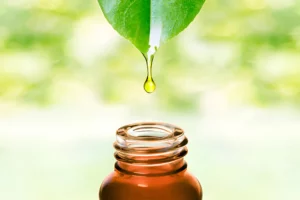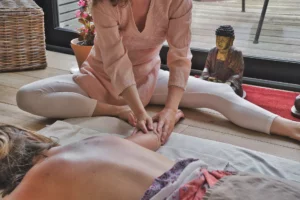Traditional Chinese Medicine (TCM) is a comprehensive healthcare approach with thousands of years of history in China and other East Asian regions. It includes a variety of practices such as herbal medicine, acupuncture, dietary therapy, and several types of mind-body exercises like tai chi and qigong. TCM is based on balancing the body’s vital energy, known as Qi, and maintaining harmony between Yin and Yang forces. It emphasizes the interconnectedness of the body, mind, and environment, and seeks to address the root causes of illness rather than just treating symptoms. TCM has gained recognition worldwide for its unique approach to health and its ability to promote overall well-being.
What Is Traditional Chinese Medicine?
TCM encompasses a range of practices, including herbal medicine, acupuncture, dietary therapy, tui na massage , exercise (such as tai chi and qigong), and mind-body practices.
In TCM, the focus is not only on treating symptoms but also on addressing the underlying imbalances or disharmonies that give rise to those symptoms.
What’s the Idea Behind TCM?
TCM views health as a state of balance and harmony, both within the body and between the body and its surroundings. When this balance is disrupted or compromised, illness and discomfort can arise.
The foundation of Chinese traditional medicine is based on several fundamental principles:
- Qi. Qi (pronounced “chee”) is the vital energy that flows through the body’s meridian channels. It is considered the fundamental substance of life and encompasses all aspects of a person’s being, including physical, mental, and emotional aspects. The flow of Qi needs to be balanced and unobstructed for optimal health.
- Yin and Yang. Yin and Yang are opposing yet interconnected forces that exist in all aspects of life. Yin represents the feminine, passive, and cool aspects, while Yang represents the masculine, active, and warm aspects. Health is achieved when there is a harmonious balance between Yin and Yang within the body.
- Five Elements. TCM also incorporates the concept of the Five Elements, which are Wood, Fire, Earth, Metal, and Water. These elements represent different qualities and correspond to various organs, tissues, and emotions.
The primary goal of TCM is to restore and maintain the balance of Qi, Yin, and Yang, and the Five Elements within the body. TCM practitioners seek to identify the underlying disharmony or imbalance that is causing the symptoms or illness. By addressing the root cause and restoring balance, TCM aims to support the body’s natural healing mechanisms and promote overall well-being.
The History of Traditional Chinese Medicine
The history of Traditional Chinese Medicine (TCM) dates back over 2,500 years and has evolved through centuries of observation, experimentation, and refinement. The origins of Eastern medicine can be traced to ancient texts such as the Huangdi Neijing (Yellow Emperor’s Inner Canon) and the Shennong Bencao Jing (Shennong’s Herbal Classic).
Legendary figures like Huangdi (Yellow Emperor) and Shennong played significant roles in the development of TCM. Huangdi is considered the ancestor of Chinese medicine, and his contributions to medical theories and practices are documented in the Huangdi Neijing. Shennong, known as the Divine Farmer, is credited with identifying hundreds of medicinal herbs and their properties, as described in the Shennong Bencao Jing.
Early TCM practitioners observed the natural world and its phenomena to gain insights into the human body. They recognized patterns and connections between nature and the human body, forming the foundation of TCM’s holistic approach. These observations led to the development of theories such as Yin and Yang, Qi, and the Five Elements.
Today, TCM continues to evolve from the term “ancient Chinese medicine” and adapt to contemporary healthcare needs. It integrates ancient wisdom with modern research, incorporating scientific methodologies to validate its effectiveness. TCM is widely used as a complementary approach alongside Western medicine and is applied in various healthcare settings for a wide range of conditions, promoting a holistic approach to health and well-being.
Read Also: What is Qi in Chinese Medicine?
What Kind of Practices Does TCM Use?
Some of the key practices used in TCM include:
- Herbal Medicine: TCM extensively utilizes medicinal herbs and plant-based remedies. Herbal formulas are created by combining multiple herbs to address specific health conditions. These formulas are prescribed based on an individual’s unique pattern of disharmony, and the herbs are believed to restore balance and promote healing.
- Acupuncture: acupuncture involves the insertion of thin needles into specific points on the body. These points are believed to be connected to channels or meridians through which Qi flows. By stimulating these points, acupuncturists aim to regulate the flow of Qi, restore balance, and alleviate various health issues.
- Acupressure and Massage: techniques, such as tui na, focus on applying pressure or manipulation to specific points on the body. These practices aim to promote circulation, relieve tension, and stimulate the body’s natural healing abilities.
- Cupping: cupping involves placing heated glass or plastic cups on the skin, creating suction. This technique is used to improve blood flow, release muscle tension, and promote healing.
- Dietary Therapy: TCM places a strong emphasis on the connection between food and health. Dietary therapy involves choosing foods and cooking methods that support the body’s balance and address specific imbalances or conditions. Certain foods are believed to have specific energetic properties that can affect the body.
- Mind-Body Exercises: TCM incorporates various mind-body exercises to promote health and well-being. Tai chi and qigong are two popular practices that involve gentle movements, deep breathing, and mental focus. These exercises are believed to cultivate Qi, improve circulation, and enhance overall vitality.
- Moxibustion: moxibustion involves burning the dried herb mugwort (moxa) near specific acupuncture points or areas of the body. The heat generated is believed to stimulate circulation and enhance the flow of Qi, promoting healing and relieving pain.
- Lifestyle and Emotional Balance: TCM recognizes the impact of lifestyle choices and emotional well-being on health. TCM practitioners guide maintaining a balanced lifestyle, managing stress, and cultivating emotional harmony to support overall health and prevent disease.
Specific practices used in TCM take into consideration a person’s unique constitution, symptoms, and patterns of disharmony. TCM practitioners employ a holistic approach, aiming to address the root cause of an issue rather than focusing solely on symptoms. These practices are often used in combination to restore balance and promote optimal health.
What are the Benefits of Traditional Chinese Medicine
TCM healthcare offers plenty of benefits for those who are seeking holistic healthcare and natural treatment options. Some of the key benefits of TCM include:
- Individualized Treatment. TCM takes into account each person’s unique constitution, patterns of disharmony, and specific health needs. Treatment plans consider factors such as lifestyle, emotions, and environmental influences. This personalized approach can result in more effective and targeted treatment outcomes.
- Natural and Low-Risk Therapies. TCM predominantly uses natural therapies, such as herbal medicine and acupuncture. TCM treatments are generally non-invasive and have a low risk of adverse reactions when administered by trained practitioners.
- Complementary Approach. TCM can be used alongside conventional Western medicine as a complementary approach. It can support and enhance the effects of conventional treatments, alleviate side effects, and improve overall outcomes. Integrating TCM with Western medicine can provide a more comprehensive and holistic healthcare experience.
- Wide Range of Conditions. TCM has been used for centuries to address a wide range of health conditions. It has shown potential in managing chronic pain, musculoskeletal disorders, digestive issues, respiratory conditions, stress-related disorders, sleep disturbances, and women’s health concerns, among others.
- Long History and Cultural Heritage. TCM has a rich history of development and practice, accumulating a vast amount of knowledge and experience over thousands of years. This historical continuity and cultural heritage add to the credibility and trust individuals place in TCM as a healing system.
It’s important to note that while TCM has been widely used and appreciated by many individuals, scientific research on TCM practices is ongoing, and evidence for its effectiveness varies across different conditions. It is advisable to consult qualified TCM practitioners and healthcare professionals when considering TCM treatments.
Where to Find a TCM Practitioner
If you are searching for a practitioner in Chinese healing, there are various resources you can explore to find a qualified and reputable provider. Remember to conduct research, read reviews, and consider factors such as practitioner qualifications, experience, and patient testimonials before making a decision. For example, if you are searching for a TCM provider in Clifton, NJ, or Brooklyn, New York, you can consider visiting Pulse Acupuncture. The acupuncture clinic offers TCM services and has qualified traditional Chinese medicine practitioners who specialize in acupuncture and other TCM modalities. Led by Marina Doktorman, M.S., L.Ac., our practitioner brings extensive knowledge and experience in Traditional Chinese Medicine (TCM) and acupuncture.
Marina Doktorman obtained her Master of Acupuncture from the Tri-State College of Acupuncture in New York City in 2001. During her studies, she focused on Chinese Herbology, deepening her understanding of the power of herbal medicine in conjunction with acupuncture. She holds a Diplomate of Acupuncture from the National Certification Commission for Acupuncture and Oriental Medicine, ensuring her competence and adherence to professional standards.
To further enhance her expertise, Marina Doktorman is currently pursuing a TCM Dermatology Certification Diploma under the guidance of the renowned TCM practitioner Mazin Al-Khafaji, Ph.D., based in the United Kingdom. This specialized certification will enable her to provide comprehensive care for dermatological conditions. Marina is expected to graduate from this program in October 2024, solidifying her commitment to continuous professional development.
At our clinic, we offer a range of services to address various health concerns and promote holistic well-being. Our treatments include acupuncture, cupping therapy, far-infrared and red light therapy, Chinese herbs, aromatherapy, moxibustion, tui-na massage, and cosmetic acupuncture. These modalities are carefully selected to complement each other, providing you with a comprehensive and personalized treatment plan.
By choosing our clinic, you benefit from Marina Doktorman’s expertise, her dedication to continuing education, and her commitment to providing personalized care. We strive to create a warm and welcoming environment where you can receive the highest quality TCM treatments tailored to your specific needs.
Experience the advantages of our acupuncture clinic and embark on a journey to improved health and vitality. Contact us today to schedule an appointment and begin your path to wellness.
Traditional Chinese Medicine – FAQ
What Conditions can TCM treat?
TCM can be used to treat a wide range of physical, mental, and emotional conditions. Commonly treated conditions include chronic pain, digestive issues, respiratory conditions, stress, anxiety, and fertility issues. However, it’s applied broadly to enhance overall wellness too.
What Should I Expect During my First Visit to a TCM Practitioner?
During your first visit, the TCM practitioner will assess your health by asking a detailed history, observing your tongue, checking your pulse, and possibly performing some physical examinations. This comprehensive approach helps the practitioner formulate a personalized treatment plan.
Is TCM Safe?
Yes, when practiced by a qualified TCM practitioner, TCM is generally safe. It’s important to ensure that the practitioner is licensed and herbs are sourced from reputable suppliers to avoid issues with contamination or adulteration.
Are There any Side Effects to TCM Treatments?
While TCM is generally safe, side effects can occur, usually from the misuse of Chinese herbs or incorrect acupuncture application. It is critical to use a qualified and experienced practitioner to minimize risks.
-
Marina Doktorman, M.S., L.Ac., is an experienced acupuncturist who obtained her Masters of Acupuncture from the Tri-State College of Acupuncture in New York City in 2001. During her studies, she focused on Chinese Herbology, a branch of Traditional Chinese Medicine (TCM) that utilizes herbs to complement acupuncture treatments. Marina is licensed in both New York (NY) and New Jersey (NJ) and holds a Diplomate of Acupuncture from the National Certification Commission for Acupuncture and Oriental Medicine (NCCAOM), indicating her expertise in the field.








